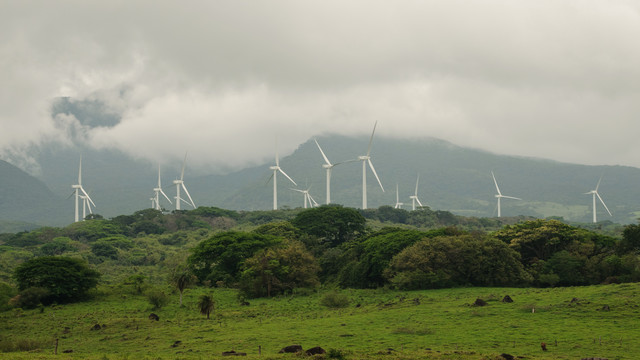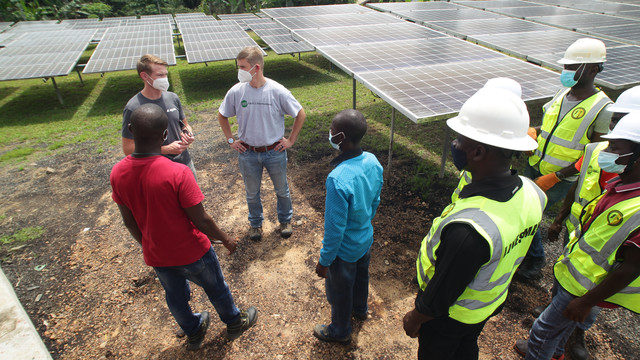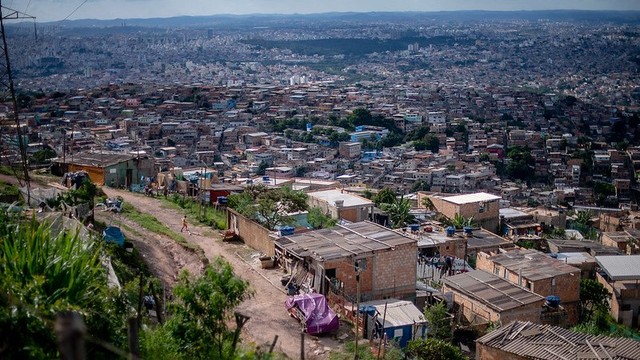The right to sustainable development: what the post-2015 agenda declaration should say – but won't
Negotiations underway this week will focus on the declaration text for the Sustainable Development Goals. Jonathan Reeves suggests this is an ideal opportunity to raise global ambition – but says the signs are not good.


The United Nations headquarters in New York City (Photo: Wally Goetz, CC BY-NC-ND 2.0)
United Nations diplomats meet this week (17 February) to consider the post-2015 agenda declaration text that will emerge from this September's summit. This text is a key opportunity to raise global ambition, but will it succeed in doing that?
The formulation of the post-2015 agenda is the opportunity of a generation, we are told. Yet there seems to me to be a paucity of ambition in discussions about what the declaration needs to say.
Why should this be the case? Have the more radically inclined already given up hope that the voluntary Sustainable Development Goals (SDGs) will actually be implemented?
Things looked very different in the run up to Rio+20. Members of the Civil Society Reflection Group on Global Development Perspectives proposed the idea of a Charter on the Right to Sustainable Development. Looking back at the group's report, I think it is still the best report on SDGs and the post-2015 agenda I have read.
So what does the post-2015 declaration need to do? I think three things are essential:
- It must communicate the essence of the agenda in a way that will inform and inspire, while also integrating the whole agenda,
- It must fill current gaps and address weaknesses in the SDGs,
- It must reaffirm international commitment to existing principles, rights and agreements.
There is though a danger that the negotiation instead becomes a case of damage limitation: which fundamental human rights will governments (or negotiators) choose to omit as outmoded or "deprioritised" in these times of austerity and insecurity? This makes the idea of an overarching right to sustainable development so necessary.
Now, what are the major gaps or weaknesses in the set of draft SDGs that the declaration could fix?
One right to rule them all
There is a widespread view within civil society that the rights-based approach that the Open Working Group (OWG) agreed to adopt for the SDGs is not sufficiently manifest in the goals and targets of the outcome document.
I wholeheartedly subscribe to this view. Sure, there is reference to human rights in the introduction. But in the text of the targets explicit coverage of rights is very limited. And implementation of the goals and targets will be driven by the text of the quantified targets.
So the right to food, the right to water and sanitation, and the rights of indigenous peoples, for example, need – for me – to be explicitly embedded in the targets and, subsequently, the indicators.
The mooted "technical proofing" of the OWG's targets could potentially address these gaps. The World Conference on Indigenous Peoples, in particular, may have provided the push necessary to bring about the reinstatement of indigenous peoples' rights. I don't hold out much hope for other rights, given that a "technical" proposal of alignment with existing rights would inevitably prompt a political debate, which there is not time to resolve.
But there is also a more fundamental gap in the existing international human rights framework with respect to the universal right to a safe, healthy environment and to the overarching right to sustainable development. Or, if you prefer, the rights of Mother Nature or the rights of future generations are not universally legally recognised.
The outcome document of the post-2015 agenda summit is the ideal opportunity to declare a universal right to sustainable development. It could establish a process to spell out this right through a charter.
This is not on the New York agenda, so it won't happen. But could we still mount a campaign to promote at least declaring the collective ambition to articulate this right through a Charter?
Now let's turn to what the declaration could do to communicate the essence of the post-2015 agenda.
Four compelling, overarching, integrative objectives
Last November, the Independent Research Forum (IRF2015) produced a brief that proposed that four overarching, integrative principles for transformative change would be useful for communicating the essence of the post-2015 agenda. These could be interpreted as principles, but I'm going to suggest they are slightly more useful as measurable objectives. They are:
- Leave no one behind
- Ensure equity for all
- Build economies that work for people and planet, and
- Mobilise collective action on a shared global agenda.
There were in fact three overarching objectives of sustainable development agreed at Rio+20 (and included in the SDG draft). The UN Secretary General's synthesis report added a set of six essential elements to the mix.
Personally I think the key thing is that the agenda needs to be communicated in a very small number of objectives that i) sum it all up; ii) resonate widely and are therefore amenable to diverse outreach campaigns; iii) integrate the environmental, social and economic dimensions of sustainable development; and iv) can be tracked through a small set of metrics that could serve as a scorecard for progress towards the agenda.
The declaration is chiefly a political statement. It does not need to speak to every citizen in the world but it needs a few key terms that can be communicated through different means to different groups if citizens are to become aware of and engaged in the implementation of the SDGs. For me, this is one argument for tapping into the equity and rights discourses.
More than this, the document needs to become a loved and well-thumbed reference for future generations of sustainable development students, policymakers and practitioners. (I was so taken by Agenda 21 that if I ever own a string of hotels, I'll place a copy in every bedside cabinet).
I think to achieve this, the declaration should explain the intrinsic interdependences between poverty, environmental degradation and inequity. Or, if you prefer, the links between wellbeing, living in harmony with nature, and equity.
And in order to reflect the universality of the agenda (and the differences with respect to responsibilities and capabilities) and make it less abstract, it should also set out the rights and responsibilities of different actors.
Lastly, given that we have 169 targets and each of these must have at least one indicator that shows whether it has been met, we need a small set of metrics (ten or fewer) that can be used (quite possibly with adaptation to regional, national and sub-national context) to track and communicate progress towards the overall agenda in a way that will allow citizens and parliamentarians to hold governments to account.
So, I suggest that the post-2015 agenda declaration should include the following:
- A declaration of the universal right to sustainable development and the establishment of a process to produce a charter to spell out this right and how it should be implemented;
- The set of four overarching objectives listed above as a means of communicating the essence of the agenda, with each objective accompanied by:
- An interlinkage narrative on how it is linked to key interdependent economic, social, environmental and governance factors and to the other objectives;
- A reprise of roles, rights and responsibilities of states, the private sector and also civil society actors; and
- A small set of meta-metrics for tracking progress towards achievement and for holding those responsible to account: an indicative list of meta-metrics is shown in the IRF2015 brief.
This proposed framework would enable the links between equitable governance, fulfilment of human rights and sustainable development to be spelt out clearly.
Even if the SDGs are not a legally-binding framework, it must be made clear that many of the SDG goals and targets are indeed implied by existing human rights and others will require new human rights to facilitate their achievement.
So here's a call to use the time between now and September to ensure that the SDGs represent not an aspirational framework for voluntary action but a shared global agenda for the collective realisation of the right to sustainable development.
Jonathan Reeves (jonathan.reeves@iied.org) is a senior researcher with IIED. This blog was first posted on the Independent Research Forum website.



